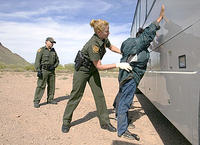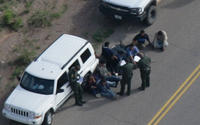-
Border security funding boosted by $600 million, paid for by increasing H-1B fees
The Senate, by unanimous consent, passed a bill last night which increases border security funding by $600 million; the bill includes $300 million for 1,500 additional Border Patrol agents, Custom and Border Protection officers, and Immigration and Customs Enforcement personnel; $196 million for Justice Department programs; $32 million for two more drones; and other money for things like communications equipment and new facilities; the measure will be paid for by increasing fees for H1-B visas
-
-
Ending "birthright citizenship"
Proponents of ending Birthright Citizenship through repeal of the Fourteenth Amendment often argue that the parents of children born to “aliens” — both undocumented and those present in the United States lawfully —are not “subject to the jurisdiction” of the United States and, therefore, their children born in the United States are not U.S. citizens — but if they were not under the jurisdiction of the United States, “illegal aliens” would not be “illegal.”
-
-
Senate may yet add funds to border security before going on recess

The Senate may yet vote for additional funds for border security before leaving for a month-long recess; Senator Schumer is going to try to push through a bill that provides an additional $600 million for the border; this includes $176 million to hire 1,500 more officers to form a strike force to be deployed in critical areas along the border; Schumer would pay for his measure by raising fees on visas for temporary skilled workers sent to the United States by Indian companies; Republicans, who propose a similar measure, prefer to pay for additional border security by taking unused money from the Obama administration’s economic stimulus program, an idea unacceptable to Democrats
-
-
U.S. mulls legalizing classes of undocumented aliens in absence of immigration reform
An internal U.S. Citizen and Immigration Services (USCIS) memo, titled “Administrative Alternatives to Comprehensive Immigration Reform,” indicates that high level officials within the Obama administration may be considering ways to legalize classes of undocumented immigrants in case Congress does not deal with formal legalization for the estimated 10.8 million immigrants without papers
-
-
Secure Communities to have greater impact than Arizona immigration law
Since 27 October 2008 through the end of May 2010, almost 2.6 million people have been screened with Secure Communities; of those, almost 35,000 were identified as illegal immigrants previously arrested or convicted for the most serious crimes, including murder and rape; more than 205,000 who were identified as illegal immigrants had arrest records for less serious crimes; during an eight-month period between 1 October 2009 to 7 June 2010, ICE figures show that 113,453 foreign nations with criminal records had been deported
-
-
Court rejects expedited handling of Arizona's appeal of injunction
In a second set back to Arizona’s tough immigration law, the U.S. Court of Appeals for the Ninth Circuit denied Arizona governor Jan Brewer’s motion seeking expedited handling of the Arizona’s appeal of Judge Susan Bolton’s preliminary injunction enjoining enforcement of many provisions of Arizona’s controversial immigration law
-
-
Arizona appeals injunction which blocked major parts of new immigration law
Citing “the State of Arizona’s right to implement a law its Legislature enacted to address the irreparable harm Arizona is suffering as a result of unchecked unlawful immigration,” the appeal claims only one issue, “whether the district court relied on an erroneous legal premise or abused its discretion” in granting the preliminary injunction
-
-
Arizona's new immigration law in effect tomorrow; degree of federal cooperation unclear

Arizona tough immigration law goes into effect tomorrow; it is not clear to what extent the Immigration and Customs Enforcement (ICE), the U.S. immigration enforcement agency, will cooperate with police who are trying to enforce it; ICE officials said they are waiting to see whether the law survives court challenges, contending that the law is unconstitutional and could lead to racial profiling; there is a history of cooperation between ICE and Arizona law enforcement: the agency has signed so-called 287(g) agreements with nine law-enforcement agencies in Arizona that either allow local officers to enforce federal immigration laws or allow jail officials to identify illegal immigrants booked into jails to be processed for deportation
-
-
Climate change could intensify Mexican migration to U.S.: study
A study published in the Proceedings of the National Academy of Sciences argues that global warming could drive millions more Mexicans into the United States in search of work by 2080 due to diminishing crop yields in Mexico; a 1.8 to 5.4 degrees Fahrenheit increase in temperature by 2080, unless agricultural methods have been adapted, would mean crop yields in Mexico would fall by 39 to 48 percent
-
-
GAO: U.S. aid to Mexico's anti-drug efforts needs better oversight
Under the Obama administration, the focus of the Merida Initiative is shifting away from high-priced helicopters and airplanes and toward reforming Mexico’s corrupt law enforcement, courts and other government institutions
-
-
Federal money to bolster crime-fighting capabilities of Arizona border counties
Governor Jan Brewer allocates up to $10 million in federal stimulus money to help law enforcement pay for costs associated with illegal immigration, including drug trafficking and human smuggling; funds will buy satellite phones, SUVs, night-vision scopes, thermal imagers and weapons
-
-
U.K. removes lead contractor Raytheon from e-Borders program

The U.K. hits out at Raytheon, removing the company from the £1.2 billion e-Borders program; the immigration minister Damian Green said earlier today that the program was running at least twelve months late and that Raytheon had been in breach of contract since July last year; Home Office says it has “no confidence” in the company; Raytheon was the lead contractor of the Trusted Borders consortium, which won a £650 million deal in 2007 to build the e-Borders system; other members of the consortium, including Serco, Detica, Accenture, and Qinetiq will keep their contracts; Raytheon was responsible for systems integration, travel services, and overall project management
-
-
Explosives car in Mexican drug war the beginning of a trend
Security experts fear that last Thursday car bombing in Ciudad Juárez, across the border from El Paso, is the beginning of deadly trend which will see a weapon used regularly —and effectively — by insurgents and militants in Iraq, Afghanistan, Pakistan, and elsewhere soon making its presence felt on the streets of Mexico
-
-
Armed escorts to accompany New Mexico livestock inspectors
Beginning on 26 July, armed deputies will accompany inspectors to the scales in a corridor that stretches southwest from Interstate 10 at Las Cruces to the New Mexico-Arizona border, along Luna, Hidalgo, and Grant counties; the sense of insecurity among ranchers along the border has increased since the highly-publicized 27 March murder of Arizona rancher Robert Krentz
-
-
Remotely controlled mechanical watch towers guard hostile borders
South Korea has began to install unmanned guard towers, equipped with sensors and machine-guns, along the DMZ; The South Korean military is emulating the system Israel has built around the Gaza Strip — a system of unmanned, armored towers, about five meters (sixteen feet) tall and two meters (six feet) in diameter; at the top of the tower is an armored shelter that conceals a remotely controlled machine-gun; operators control the surveillance and weapon systems atop these towers from a remote central command-and-control location
-
- All
- Regional
- Water
- Biometrics
- Borders/Immig
- Business
- Cybersecurity
- Detection
- Disasters
- Government
- Infrastructure
- International
- Public health
- Public Safety
- Communication interoperabillity
- Emergency services
- Emergency medical services
- Fire
- First response
- IEDs
- Law Enforcement
- Law Enforcement Technology
- Military technology
- Nonlethal weapons
- Nuclear weapons
- Personal protection equipment
- Police
- Notification /alert systems
- Situational awareness
- Weapons systems
- Sci-Tech
- Sector Reports
- Surveillance
- Transportation
Advertising & Marketing: advertise@newswirepubs.com
Editorial: editor@newswirepubs.com
General: info@newswirepubs.com
2010-2011 © News Wire Publications, LLC News Wire Publications, LLC
220 Old Country Road | Suite 200 | Mineola | New York | 11501
Permissions and Policies
Editorial: editor@newswirepubs.com
General: info@newswirepubs.com
2010-2011 © News Wire Publications, LLC News Wire Publications, LLC
220 Old Country Road | Suite 200 | Mineola | New York | 11501
Permissions and Policies
